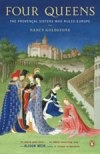
SPQR on a manhole in Rome.
On my first visit to Rome, what most astounded me was that “S.P.Q.R.” was actually imprinted on manholes in the street. I had expected to be awed by a sense of antiquity from the Coliseum, the Forum, and the many ruins sprinkled about the city. But, for me, standing right on the famous Roman phrase that I had studied in school was a palpable ‘history comes alive’ moment.
So I was most eager to delve into Mary Beard’s new book on ancient Rome, SPQR.
Note, this is a political history of Rome. There is an in-depth look at Pompey the Great, and also his namesake city of Pompeii, but very little about Mt. Vesuvius and the destruction of Pompeii. Beard doesn’t bother with the importance of Roman Concrete or the development of aqueducts (covered extensively elsewhere). Instead she focuses on social and political innovations.
For example, while conquered peoples were typically brought back to Rome as slaves, Beard explains that a large number of these slaves would be freed within their own lifetimes. Some would even gain citizenship, living out their days in the city of Rome or returning to native lands.
Indeed, the definition and scope of Roman Citizenship continually evolved and expanded, adding to the cosmopolitan mix of the city and the empire. This idea of shared citizenship—that one could be a citizen of a province and also a citizen of Rome—was a totally new concept that fueled military success. This countered a longstanding tradition of parochial allegiance to city states or regions, setting a precedent that continues in nations today.
Beard also gives us a fresh look at the Romus and Remulus myth and how this founding story of fratricide was mirrored in the repeated violence of Roman politics. Well before Julius Caesar, murder was a method of the Roman Republic. One election was broken up when a cabal of angry senators bludgeoned Tiberius Gracchus and his supporters. Sulla marched on Rome with an army (twice), sparking a civil war that killed civilians in the streets and senators sitting in the senate house. Even Pompey the Great was decapitated by supporters of the up-and-coming Caesar. “His life lasted longer than his power,” Beard quotes Cicero.
This only intensified with the rise of the Roman Empire. Assassination was the de facto method of succession. “Vespasian in 79 CE was the only emperor in the first two dynasties to die without any rumors of foul play surfacing.”
 Indeed, SPQR at times reads like a House of Cards take on Roman history, as Beard narrates with suspense the political wranglings, betrayals, and changing power players over the centuries. I found all of this particularly compelling—and relevant—in light of the recent political upheaval and shifting alliances in the United Kingdom following the Brexit vote.
Indeed, SPQR at times reads like a House of Cards take on Roman history, as Beard narrates with suspense the political wranglings, betrayals, and changing power players over the centuries. I found all of this particularly compelling—and relevant—in light of the recent political upheaval and shifting alliances in the United Kingdom following the Brexit vote.
Despite the intensity of her subject matter, Beard keeps it lively and readable.
She reminds us that Commodus was the emperor portrayed in the popular movie and Oscar Best Picture winner Gladiator. We also learn that famed British Celtic warrior Boudicca (who led an uprising against the Romans) is buried near Platform 10 of Kings Cross station. Nor is Beard too scholarly to resist calling Arminius “Herman the German.”
My only complaint is that, despite the title, Beard doesn’t really addresss the phrase “Senatus Populusque Romanus,” aka S.P.Q.R., except for a brief mention in the introduction.
I’m still curious about the provenance of this fabled motto, which means “the Senate and the People of Rome” and how much it was really averred in its day.
Nevertheless, SPQR is an informative, fascinating, and engrossing read which I highly recommend.
Mary Beard, Cambridge Professor & Classics Scholar
Mary Beard’s Blog: A Don’s Life





